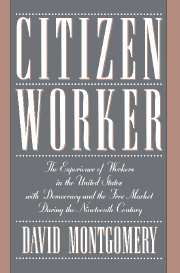 Citizen Worker
Citizen Worker 2 - Policing People for the Free Market
Published online by Cambridge University Press: 16 November 2009
Summary
The term “market” has many meanings and many more connotations, which are often jumbled together in order to impart some desired ideological message or other. The “propensity to truck, barter, and exchange one thing for another,” which Adam Smith believed arose from man's “almost constant occasion for the help of his brethren” and distinguished humans from all other species of animals, has been variously identified with a village fair, the Chicago grain exchange, and the morning shape-up outside the gates of a packinghouse. As Barbara J. Fields has noted, to describe people as “market-oriented” carries about as much information as to say that they were “clothes-wearing.”.
Specifying what we mean by market activity has especially important bearing on the question of human liberty. On one level we may note that so-called free-market economies have coexisted at various times with governments as libertarian as that of contemporary Sweden and as oppressive as that of Pinochet's Chile. The creation of such an economy has always entailed forceful governmental suppression of its foes. In the United States it involved civil war. On another level, the range of personal behavior tolerated or even encouraged by marketing has varied radically from one context to another. The market-places of early modern Europe, where men and women haggled over wares they usually could hold in their hands, were notorious theaters of license and subversion. The ostensibly impersonal relationships of commodity exchange made famous by Adam Smith imposed a firm behavioral discipline on buyers and sellers alike.
- Type
- Chapter
- Information
- Citizen WorkerThe Experience of Workers in the United States with Democracy and the Free Market during the Nineteenth Century, pp. 52 - 114Publisher: Cambridge University PressPrint publication year: 1994


